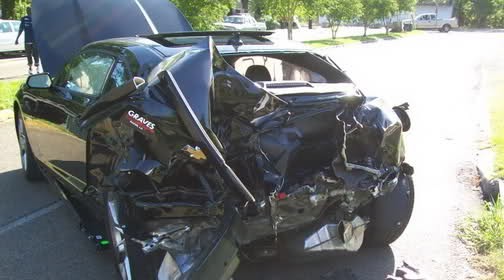I just got into an bad accident, will my car be totaled?
If you have just been in an accident severe enough for your car to be towed off, you might be in a bit of a very scary limbo while you wait for the insurance company to determine what to do next. Like most people, you are bracing yourself for the worst: the insurance companies decides to total your car.
The very fact that you “Googled” this search phrase means you are scared. I would be too. To make matters worse, this process can take a couple of days even a couple of weeks, so while you are waiting with nerves on edge let me help alleviate some of the tension and just explain everything you need to know, as well as give you some options should you get the bad news.
First let me begin by saying that I can’t answer this question for your specific accident because it comes down to a couple of factors. The insurance company will ultimately determine this decision, they are writing the checks and they decide, but you do have some leeway in the decision.
When you got into the accident, even though the car was damaged it might appear to you as if it is repairable. However you may be surprised to find that your insurance company decides to total your car.
There are two types of losses:
1. A total loss- The car is just un-repairable, maybe was cut apart to get you out safely, cannot be repaired safely, or was just completely wiped out by an accident, a flood or some other “act of god”.
2. An economic total loss- the cost to fix exceeds the value of the vehicle.
In a total loss situation, you wouldn’t want the car back anyway. But the “economic total loss” sometimes baffles consumers and in some cases can really ruin your day. So lets talk about the economic total loss.
Remember the insurance company does not HAVE to pay to get your car fixed. They are only bound to replace the value of the vehicle prior to the accident. This is the key point here. While the car may be valuable to you, this is strictly a business decision for the insurance company and they are going to go the most cost effective route every time.
In an economic total loss situation, your car has value for its parts (the ones not damaged) and for the scrap metal. All major insurance carries have entire buildings and departments whose only job is to manage the salvage process.

When your car has to be towed to a lot, an insurance adjuster is going to come out and make a decision on whether to total your car right on the spot, or to take it to phase two.
Phase two is to get it to an auto body shop for an estimate. Here is where you the consumer have some say. You get to chose where the car goes, and the insurance company pays for that. They may give you some names that they prefer (see our previous blog on the DRP), but you can take the car wherever you want, that is your right. So don’ get bullied into having your car towed to some shop you have never heard of. Pick a shop you trust and tell the insurance company that you want it estimated there. If you feel any undue pressure from the insurance company, kindly remind them that this is called steering, and there are laws in your state to protect you from this.
If you need help finding a great shop, you can always use Autobody-review.com to help you find one.
The auto body shop will write an estimate for the car once it arrives. Again it goes back to the adjuster to determine what the insurance company will do. (This can take a couple more days).
The insurance company will take that estimate, it will get a dollar figure for the salvage value of the vehicle, it will factor in any other pre-existing damage, condition, and mileage, and it will look at the average selling price of used cars of the exact same year make and model in very similar condition.
The adjuster will then take the Replacement value price, and subtract the salvage value of your vehicle, and compare that to the repair estimate cost, just like the one you had, to make their determination. The lowest number will usually win. So if it is cheaper to fix it, it gets fixed. If it is cheaper to junk yours and buy you a new one, they will just write you a check. But there is one wrinkle. If the price of the replacement minus the salvage is within 70-80% of the repair estimate, the vehicle might still get declared totaled.
This is much to the chagrin of auto body repair shops and car owners. Let me explain why this happens. When an estimator is writing an estimate, they can only write what they can see. If you car is all smashed up, there may be things that are damaged, that cannot be seen until the car is taken apart, which usually does not happen at the time of the initial estimate. This additional work is called a supplement, and can sometimes set the cost of the repair OVER the cost of a replacement vehicle. So as a rule, the Insurance companies set a threshold of between 70-80% of the cost of a replacement vehicle.
Lets use an example to help illustrate this.
Scenario A: Let’s say that cars just like yours are selling for $20,000 in your area. Lets say the repair damage estimate is $16,500. And lets say that the insurance company can get $8,000 for your car selling it to a junk yard. the math looks like this:
$20,000- $8,000= $12,000. Cost to repair is $16,500. Your car will be totaled, because the insurance company will only be out of pocket $12,000 to get you in another car just like yours.
Scenario B: Lets say your car is worth $25,000, and the damage is $10,000, and the Salvage is still $8,000.
$25,000- $8,000=$17,000. Cost to repair it is $10,000. The car is getting repaired.
Scenario C:
Replacement cost is $20,000. Estimate to repair it is $10,000, and the salvage is $8,000.
$20,000-$8,000= $12,000. Repair is $10,000. The car is most likely going to get totaled.
Why? Because the replacement cost is withing 20% of the repair costs, and should the repair costs require a supplement for additional unseen damage, in the long run, the $12,000 payout was the cheaper option. Insurance companies have the money to gamble that the final repair bill would most likely exceed the original estimate, and so they just cut a check and move on to the next claim.
What if you still owe money on your car and it was totaled?
There are many cases where you may owe more than what you will get from your insurance company. For example, if you had negative equity in your vehicle (you traded in another vehicle and still owed money and rolled that difference into your loan), there is a good chance you will still be upside down, and will have to come out of pocket for the difference. So lets say you owe $15,000 on the car that was damage, but a replacement vehicle is only worth $12,000, you will need to come up with the $3,000 to settle the loan.
If you purchased a new vehicle and it depreciated faster than you paid it off, is another example where you may still owe more than you will receive from the insurance company. Lets say you were in year one or two of a 60 or 72 month loan. Chances are you will end up owing more money than you will get back.
Will the Insurance company replace my car with a new one?
If your insurance company offers Guaranteed Replacement Cost coverage for new cars then your payment will cover the cost of a new car. Without this coverage, your company is only required to pay you the actual cash value of your car minus the collision deductible. This cash value should be enough to buy a used car similar to your old one.
Also if you had Gap Insurance, the Gap coverage might cover new car replacement. You need to check with your insurance company regarding your coverages.
Will my check get issued for the full amount?
If you own the car (no car payments), you will receive payment within a couple of days. If you are still financing it, this will depend on if you have leased the car or if you owe a bank or other financial institution. If you leased the car, the full amount will go to the leasing company. If you financed the car, the amount owed on the car will go to them and the rest to you. If your insurance gave you a temporary rental car, ask your adjuster how long you will be able to keep the car before having to buy another one.
What if I want to keep the car and repair it myself?
Sometimes because of sentimental attachment, people want to keep and repair their cars after the accident. Your ability to do so depends if your state laws permit this, and if the insurance company will allow it. The salvage division of your insurance company will determine the fair market value on the car. When the fair market value is determined, this amount gets deducted from your settlement; you get your car back with the remainder of the settlement (if any) along with a salvage title. The salvage title will not allow you to register your car until you make all the repairs, and even then it will always shave a salvage title, which could affect future re-sale.
So I hope that I have educated you enough with the background involved in determining whether your car will be totaled or not. Feel free to comment in the comments section with any concerns you might have or additional questions.

